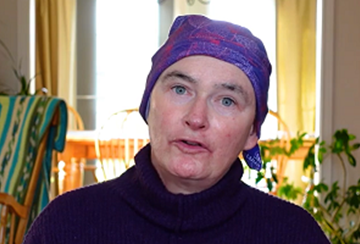

La pandémie de COVID-19 a été difficile pour tout le monde, mais surtout pour des patients gravement malades comme Robin. Dans cette vidéo, celle-ci parle des difficultés qu’elle a éprouvées pour obtenir des soins nécessaires pour son cancer colorectal de stade 4 en raison des changements apportés à la prestation des soins de santé pendant la pandémie.
L’accès des patients aux meilleurs soins possibles représente une valeur de base pour Amgen Canada. Nous croyons que ceux-ci devraient pouvoir bénéficier de communications régulières avec leurs fournisseurs de soins de santé. Dans cette vidéo, Robin parle des façons dont la télémédecine a été utile — surtout pour les personnes aptes à tirer parti de contacts plus fréquents avec vos fournisseurs de soins de santé.
Le jour où le confinement a été annoncé dans ma province, est le jour où mon médecin de famille m'a appelé pour me dire que mon cancer avait récidivé. J'ai un cancer colorectal de stade 4 et je fais de la chimiothérapie pour le traiter.
La COVID a vraiment compliqué les choses pour le traitement des cancers, que ce soit pour le médecin, mais aussi pour le patient. Alors, ça a eu d’énormes répercussions sur mon expérience. J'ai le un cancer depuis 10 ans et j'ai eu des traitements importants
deux fois par le passé, alors cette fois je vois la différence entre ce que c'était avant et maintenant. D’habitude, il faut à peu près un mois pour commencer une chimiothérapie.
Cette fois, ça a pris trois mois. Et quatre à cinq mois se sont écoulés avant que je puisse parler à un chirurgien, ce qui est très long par rapport à mes expériences précédentes. Je dirais que je n'ai pas le même accès aux soins de santé que j'avais avant la COVID.
Les capacités de réponses ont clairement diminué. Plus tôt dans la pandémie, j’aurais aimé recevoir des informations des médecins ou du centre de cancérologie pour me dire qu’ils étaient au courant de mon diagnostic et qu’ils s’occuperont bientôt de moi.
Un message rassurant, pour me montrer qu’ils ne m’ont pas oubliée. Habituellement, quand on va faire de la chimiothérapie, on peut avoir un ami ou son conjoint avec nous. Avec la COVID, ce n’était pas possible. J’ai dû y aller seule. Les téléconsultations ont rendu les rendez-vous en oncologie plus facile tout en évitant d’être exposé à la COVID.
En plus, mon conjoint pouvait être présent aux conférences Zoom, alors que ce n’était pas le cas en présentiel. J’aimerais voir le corps médical utiliser la télémédecine plus souvent.
Pendant des années, les patients ont demandé à ce les médecins soient rémunérés pour des téléconsultations. Et pendant des années, on nous a dit que ce n’était pas possible. Une infirmière m’a dit un jour que la communication était de la médecine. Alors plus un médecin, et une clinique communiqueront avec un patient pour le rassurer concernant son traitement, plus le patient se sentira bien.